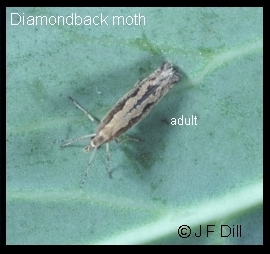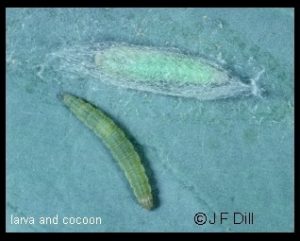Diamondback Moth


The Diamondback Moth (Plutella xylostella), sometimes called Cabbage Moth, is considered to be one of the most important pests of cruciferous crops virtually worldwide, particularly in areas that do not experience really cold winters the way that Maine does. Really cold winters kill off the overwintering moths, but they inevitably re-invade colder areas like Maine each spring (they can be carried great distances by the wind). Moths lay lots of eggs, and the resulting larvae–which can likewise be very numerous–damage the leaves, buds, flowers, and seed-buds, potentially leading to complete loss of the leaf tissue, leaving only leaf veins behind. This kind of injury is obviously ruinous to young seedlings. On cabbage, broccoli and cauliflower, their feeding can interfere with head formation and the presence of the larvae in the florets can result in rejection of the produce by customers and wholesalers, etc.
Virtually all cruciferous crops are subject to infestation and feeding injury (though some are preferred more than others), including: broccoli, Brussels sprouts, cabbage, Chinese cabbage, cauliflower, collard, kale, kohlrabi, mustard, radish, turnip, and watercress.
Additional Information:
- Diamondback Moth (University of Florida)
- Diamondback Moth (Penn State)
